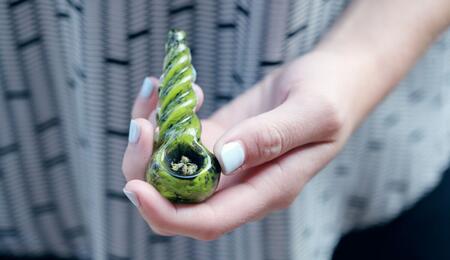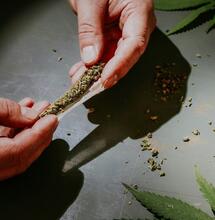Medicinal Cannabis and Neuropathy

Recent research sheds light on the benefits of medicinal cannabis use for neuropathy treatment, and what practices doctors and patients may want to consider. One survey has found that patients who used higher-potency THC cannabis experienced greater pain relief. In a separate study, researchers looked at the benefit of cannabinoid inhalation for facilitating pain relief and sleep improvements in neuropathic patients.
The latest studies on cannabis and neuropathy may offer important instructions for both patients and health professionals on how to use medicinal cannabis for better therapeutic gains.
Neuropathy is nerve damage, in particular the nerves outside the brain and spinal cord. It’s not a single medical condition, rather, the term describes a range of health problems involving nerve damage and the symptoms that the patient presents. Pain in the arms and the legs is a very common presentation of neuropathy. However, the disease can affect other body areas and functions, including digestion and urination.
While there is no cure for neuropathy, those who struggle with this condition can prevent and manage the condition through diet, lifestyle and therapy. Cannabis is one of the medicines found to help with neuropathy. Thus far, neuropathy is on the list of qualifying conditions for medicinal cannabis use in ten U.S. states.
Cannabis is as Effective As Opioids for Neuropathy Treatment
Neuropathy is almost always accompanied by pain. Patients may also experience tingling and burning sensations, muscle weakness and wasting. Recent survey confirms that medicinal cannabis can be as effective as opioids in neuropathic pain treatment. The majority of the patients interviewed in the study also said that they’re using marijuana with more than 20 percent THC.
Conducted by NuggMD, a company that connects doctors and patients, the survey included 603 patients who claimed that neuropathy was among their two main reasons for using medicinal cannabis.
As part of the survey, patients rated their pain levels on a scale of 1 to 10, before and after using cannabis as a treatment. The findings from the survey, first reported by Marijuana Moment, clearly illustrate that cannabis offered much-needed relief.
According to the study, patients had an average pain level of 7.64 before cannabis use, while the average pain level after cannabis use was 3.44. The average pain relief experienced by patients was 4.2 out of 10, according to the report shared with Marijuana Moment.
Intriguingly, the results from the NuggMD research did not quite match the results of earlier studies on cannabis use for neuropathy. The NuggMD’s survey indicates that patients who use high-THC cannabis experience greater relief from neuropathic pain. Earlier cannabis research for neuropathy has a focus on low-THC cannabis; it’s often orientated on CBD, uses of isolates and not full-spectrum products. For the first time now, there is significant evidence that patients were actually helped from higher potency cannabis.
The majority of neuropathy patients or almost 59% reported using marijuana flower with over 20% THC. A second group, or roughly 26% of the interviewed patients, reported the use of concentrates, which usually contain high amounts of THC. Roughly 11% said they used flower under 20% THC and less than 4% said they used non-inhalable products.
Another Study Highlights the Benefits of Cannabis Inhalation
In a separate study, German researchers came across important evidence on how medicinal cannabis alleviates pain and improves sleep in neuropathy patients.
The observational study, which focused on cannabinoid inhalation, was published in the journal Medical Cannabis and Cannabinoids. In it, the Hamburg scientists analyzed data provided by Algea Care GmbH, a German telemedicine platform for treatment of chronic illnesses with medicinal cannabis.
The German study involved 99 patients who presented with a severe form of neuropathy. Some of the participants were instructed to inhale at a fixed time, and others every time they had pain attacks.
The patients were followed for six months, including three months during their treatment between July and Sep. 2021, and three months after the treatment. Patients were asked to rank their pain and sleep disturbance on a scale from 0 to 10.
In the beginning, the majority of patients reported severe pain; 96% scored over 6, the indicator for severe pain, while the median pain score was 7.5. Six months after cannabis inhalation therapy, pain scores dropped significantly. The median pain number stood at 3.75. In follow-up consultations, the pain score continued to fall slightly to 3.5 and finally stopped at 3.
Those with severe pain decreased from 96% to 15% in the follow-up assessment sessions, and the good results remained consistent throughout the entire six-month observation period.
The patients’ monitoring also revealed that cannabis inhalation further helped the neuropathy patients with sleep disturbance. If the median score for severe sleep disturbance was 8 in the start of therapy, in the end it dropped to 2.
Over the six-month trial, 97 out of 99 patients reported improvements in their general condition. While no serious side effects were reported, there was the occasional occurrence of mild side effects such as dry mouth, fatigue, dizziness and increased appetite. In rare single cases, also intoxication, nausea or restlessness.
In Conclusion
The latest research adds substantial evidence that medicinal cannabis can be of exceptional value for neuropathy patients, especially those who suffer severe symptoms. The research also signals doctors and patients to look for the more preferred pathways of cannabis treatments. Apparently, it does matter the amount of THC in medicinal cannabis products consumed by patients, and it does matter the way of delivery in the body.
Read other related news and research on Soft Secrets:
- Feeling High = Greater Symptom Relief











